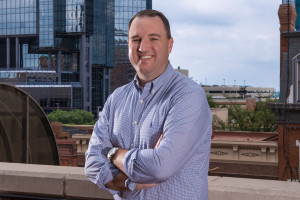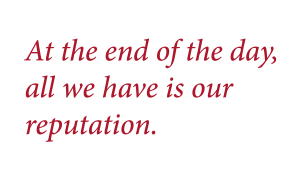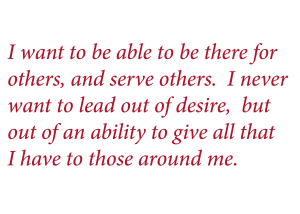Source: Leavitt Digital
 Leavitt Digital is conducting a number of “Spotlight Interviews” with industry leaders in the Commercial Real Estate Sector whom we feel lead by example. Leavitt Digital’s first interview is with Dave Wilson, CCIM / Executive Vice President of Development and Brokerage Manager at Lockard.
Leavitt Digital is conducting a number of “Spotlight Interviews” with industry leaders in the Commercial Real Estate Sector whom we feel lead by example. Leavitt Digital’s first interview is with Dave Wilson, CCIM / Executive Vice President of Development and Brokerage Manager at Lockard.
LD: What career path did you want to take when you were in college?
DW: When I was in college, I was going to school for a Leisure Services degree. I wanted to go work at a Christian camp and be an Executive Director of a camp someday. I really liked working at camps growing up and thought this was a great move for me. I then got married in college and had to work full time while going to school full-time, so I got a job at a bank and went to school full time in the evenings. I had switched schools my junior year and said, “what degree can get me through the quickest transferring my credits?” So I left University of Northern Iowa and transferred to Upper Iowa University and went to school for a Bachelor of Science degree in Human Services. This was actually really good because I was able to study what makes people do the things they do, which really helps with sales.
LD: What events in your career path brought you to Executive Vice President of Lockard Development?
DW: As I was working at the bank, I kept getting promoted. From working as a bank teller to becoming a repo man, I then became assistant branch manager of a branch in town, and then Vice President of a branch. I realized that I didn’t want to sit behind a desk all day, so I got into the real estate business by selling some homes and quickly realized that residential wasn’t for me. I wanted to do commercial transactions because they don’t have the “personal” feel like residential. I was hired by Lockard Companies in 2000, and worked my way up doing brokerage, development, etc. When I started in 2000, we had 9 employees. Today, we have about 35 employees at the home office in Cedar Falls, Iowa and I manage brokerage offices in Dubuque, Iowa, Davenport, Iowa, Des Moines, IA and a partner office in Dallas, TX.
LD: Can you tell us a little what your “average” week of work is like? Is your time spent evenly doing business development for new projects, managing your current projects, and seeking out tenants for projects?
DW: I travel a lot for my job, which I really don’t mind. It gets me out of the office and dealing with people one-on-one which I love doing. Business is all about people. I think sometimes we forget to deal with people face-to-face rather than over the phone or by email. I also get a lot more accomplished when I’m meeting with them then when I’m in the office trying to communicate through other means. I would say that I spend a lot of time reviewing new projects for our pipeline, following up on purchase agreements, LOIs, and getting deals over the goal line. Since I am on the road a lot, I love the ability to login to my office from wherever I am and work from the airport, hotel room, or wherever. I actually get more work done away from the office sometimes than I do when I’m in the office – no distractions! I am constantly managing projects in the pipeline, and trying to find tenants for new projects. We have started to hire outside brokerage houses to assist in leasing efforts, so that I can focus on new development opportunities and finishing existing projects. We have a great team at Lockard, so everyone knows his piece which needs to get done in order for the project to be successful.
LD: Lockard Companies is based in Iowa and you are doing development projects on a national basis. How do you target what markets and deals make sense for Lockard to pursue?
DW: Lockard is very methodical on what projects we go after. We have a saying around here that you do business with people you know, like and trust. So we have created an environment to build upon past relationships and on new ones. We like to fly under the radar and go into markets/projects that we may be the 3rd developer in. What do I mean by that? Well, a lot of times other people have tried and failed, and we can ride in on the white horse, ask for incentives from cities/municipalities because of the fact that they want projects happening as much as we do. We used to throw 50 deals on the wall and hope one sticks, and then work that one until it is dead. We HAD to work it because it was the only project out there that made sense at the time. Now, we throw 50 on the wall and 48 of them are sticking, so we have to be very selective on working our processes to see if they pass the “duh test.” We determine if it is in a market that we want to do business in long-term. Why? Because we want to create a great long-term partner with the city in which we locate. We want to do more than one project in the market(s) we go. We do that by doing what we say we are going to do. Many times we have worked with sellers of land to buy a tract and it hasn’t been the right timing for whatever reason. We have terminated the agreement well in advance of the due diligence expiration period. We do that because it isn’t fair to the seller to tie up their ground for long periods of time, but rather we want to leave the door open for the right time. When the time comes for a project to make sense, it is a lot easier to call that Seller back up and say we are ready to move on your property and they know we aren’t blowing smoke. We are ready to go. People ask us all the time how we get our projects outside the state of Iowa. We get them by past referrals from clients. They tell their friends that these guys can be trusted and will get it done. At the end of the day, all we have is our reputation.
LD: Lockard is well rounded company that focuses its development/ ownership in the Retail, Medical Office, and Senior Living Sector. Lockard has been in other property sectors over the years, what made these three property sectors the core of Lockard’s strike zone?
DW: We have done retail developments for years. Retail has been our backbone. Thankfully in 2005 we started working in the medical office/senior living sector. When the market tanked in 2008 in retail, we were still doing a lot of healthcare projects. As a result, we remained profitable during the downturn. It wasn’t easy, but I’m really glad that our eggs were not in one basket with retail only during this time. Since 2008, a lot of retail developers have tried to dip their toes into the healthcare arena, and we already had a leg up on them because of already being in the industry. Retail and healthcare have seen huge integration over the years. Many of our retail projects have medical users in them and vice-versa. People want services nearby when they go to the doctor. Just like retail, people want to be able to pull up to their doctor or clinic and get in and get out. We have been constructing a lot of freestanding emergency departments in Texas, and they are on the “Walgreens corners of old.” They want to be in retail, high trafficked locations. We have determined that we can really focus on these three areas and be successful. We do not try to be all things to all people, but just try to be excellent in certain areas that we can strive to be excellent in. Our three core values are excellence, integrity and humility, and we want to exemplify those in all areas of the industries we are involved
LD: Everyone has a few transactions that stand out in the careers. What is one deal thus far in your career that stands out to you and what is the significance to that deal?
DW: I think the one transaction that really stands out is working on a deal in Fort Worth, Texas called Renaissance Square. We purchased 67 acres in SE Fort Worth which is a low demographic area which did not have retail services for over 50 years. It was a former Masonic Home property that was never on the tax rolls in the City of Fort Worth. There were 150,000 people within 3 miles with no place to shop, eat, buy groceries, etc. We were able to secure a Wal-Mart Supercenter to locate on the property and then brought a bunch of other retailers and restaurants to the area. We helped create job training classes for people of the area to go through in order to learn how to interview and put together resumes. Once they completed the class, they were guaranteed at least getting an interview with some of the tenants in the project. I will never forget walking into the Wal-Mart one day and one of the ladies who was a door greeter said to me, “you must be one of the developers.” I wondered how she knew, and she said, “you’re wearing a suit.” With tears in her eyes, she then went on to say, “I just want to thank you.” I asked her for what? She said for giving me this job! She said, no you  don’t understand, see I was at my wits end and didn’t have food for my table, a job to go to, and was ready to lose my house. One night, I was on my chair with a rope around my neck getting ready to end it all when the phone rang. It was Wal-Mart and they wanted to interview me. She said, that phone call saved my life!” It was at that moment, that I realized that my job was more than just real estate. It really does change people’s lives. It was then that our mission statement of Lockard really came to life. “Enhancing the quality of life in the communities we serve.”
don’t understand, see I was at my wits end and didn’t have food for my table, a job to go to, and was ready to lose my house. One night, I was on my chair with a rope around my neck getting ready to end it all when the phone rang. It was Wal-Mart and they wanted to interview me. She said, that phone call saved my life!” It was at that moment, that I realized that my job was more than just real estate. It really does change people’s lives. It was then that our mission statement of Lockard really came to life. “Enhancing the quality of life in the communities we serve.”
LD: There are no shortage of Commercial Real Estate organizations, you are very involved with the CCIM organization. Has your involvement with the CCIM organization opened doors or created opportunities that would not have been made to you otherwise? If so, please explain.
DW: Absolutely! It means the world to me. I am a networker. I love to connect deals with people, and people with deals. Ever since I received my CCIM pin in 2002, I have been actively involved in the CCIM Institute. I worked through the chairs of my local Iowa Chapter, was selected as a student in Jay W. Levine Leadership Academy within the Institute, and have served on numerous boards and committees throughout the organization. I currently serve on the Executive Committee, Board of Directors, and CCIM Foundation Board of Directors. In October, I am running for 1st Vice President of the Institute. The organization has been a huge resource for our company and me. I have been able work with other CCIMs around the country to source deals, and close deals. One of the deals we worked on was with a fellow CCIM in Norman, OK. We were able to become the master developer of the Norman Regional Hospital, all because of an introduction by a fellow CCIM to the hospital. We did several deals over about a 5 year span.
LD: What advice have you received that has been instrumental in your success?
DW: I would say that the biggest advice is to just be myself. No matter what I’m doing, where I’m going, and whom I’m working with, it is so important to not be someone I’m not. As I said earlier, people do business with people they know, like and trust and it takes a lifetime to build a reputation and only takes one day to screw it up. It is so important to be a servant leader and let others shine. I want to be able to be there for others, and serve others. I never want to lead out of desire, but out of an ability to give all that I have to those around me. John Maxwell once said, “people don’t care how much you know, until they know how much you care.”
